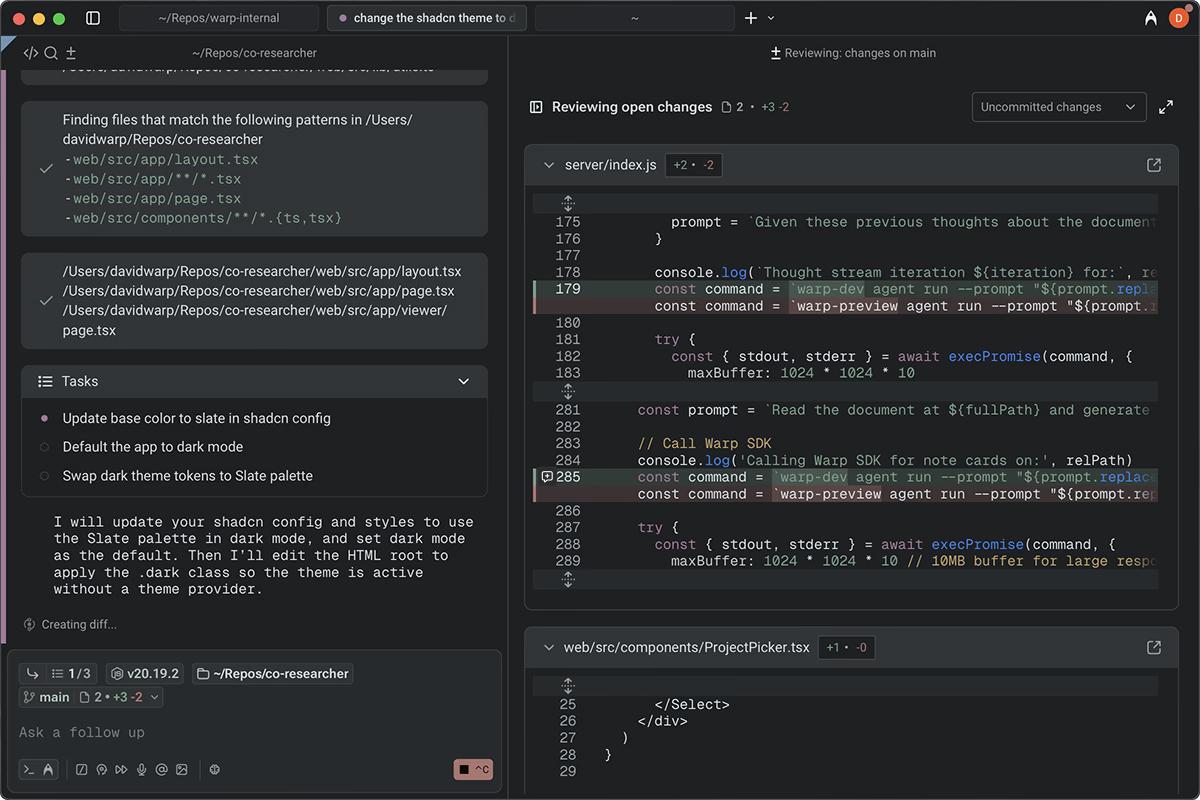
22 Sept 20255 minute read

22 Sept 20255 minute read

Warp, a company that so far has been turning the terminal into an agent-driven development environment, is pushing further beyond the command line with Warp Code.
First announced in early September, Warp Code is striving to fill the void between prompts and production-grade code, serving a lightweight editor and review system built directly into Warp.
Warp’s core pitch for Warp Code is speed, claiming it’s the fastest way to get agent-generated code “from prompt to production.”
What that looks like in practice, essentially, is absorbing workflows that used to live elsewhere. Code review happens inline instead of in Git; small edits can be made in a built-in editor rather than bouncing to an IDE; project context persists through a WARP.md file rather than having to be re-prompted each session.
The result is a tighter loop between what the agent proposes, and what developers actually accept, modify, or ship.
“Even as agents improve, there’s still a big gap in getting from prompt all the way to prod\[uction\],” Warp founder and CEO Zach Lloyd said. “Even the most powerful agents like Warp still benefit from the knowledge, context, and guidance of experienced engineers.”
Arguably, the most visible addition to the mix is the inline code review feature that allows developers to view suggested changes as diffs, so they can inspect each line, request modifications, or make edits directly themselves.

Elsewhere, a new built-in editor covers the narrow loop where agent-generated code often breaks down. It’s not really aiming to replace VS Code or JetBrains, but for those situations where a developer needs to tweak a function or fix a subtle issue before committing, it should do the job nicely.
The editor includes syntax highlighting, tabbed navigation, and a file tree, enabling developers to open files directly, jump between them quickly, and make targeted edits without leaving Warp.
Other notable features include support for project-level context through a new WARP.md configuration file, which lets teams persist agent instructions across sessions; and expanded codebase indexing to make it easier for agents to work with larger repositories.
Initial reaction from the development community has been mixed, with one Hacker News member questioning — aside from having a ‘worse’ editor than Cursor — how Warp Code was functionally different from its rival.
Another respondent countered this notion, arguing that “sometimes worse is better,” and that Warp’s reduced focus on editing hits a sweet spot between a code assistant like Claude and a full IDE, giving just enough flexibility to steer the agent without overwhelming the workflow.

More broadly, others questioned whether any smaller players – Warp or otherwise – can realistically compete with the big AI labs. One commenter dismissed Warp Code as a ‘desperate pivot,’ adding that companies like OpenAI and Anthropic enjoy structural advantages in cost, post-training, and enterprise reach.
But others pushed back, pointing to opportunities in specialization: tighter integration with developer workflows, options for self-hosting, and greater data privacy.
Another argued that the ‘scaling myth was a lie,’ with large models plateauing – suggesting that innovation now lies in techniques like tool use, better prompting, and model concurrency rather than raw size.

In the end, Warp Code isn’t trying to outbuild the big labs on models — it’s staking ground in the middle, where agents meet human judgment. And that’s where the real contest may play out.
As Warp’s founder Zach Lloyd put it: “Too often agents write code that almost works, but has subtle issues that end up taking a lot of time to understand, debug, and commit,” he said. “The solution is not to back away from developing by prompt – instead it’s to improve the prompting workflow so that developers have more comprehension and control."